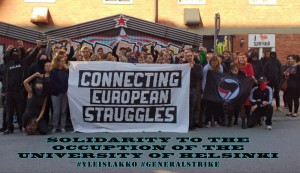Around three hundred people joined the Connecting European Struggles meeting that took place between the 18-20th of September 2015 in Malmö, Sweden. Activists from Greece, Germany, Finland, Denmark, the UK, Sweden, France as well as other countries discussed issues concerning gender, crisis and (anarcha-)feminism.
The pan-European perspective of the meeting raised questions on similar situations and possible alliances-strategies across borders. In particular, this was touched upon by groups such as the Beyond Europe network, consisting of networks from Germany, the UK, Cyprus, Greece and Austria. Overall it appears that there is a feminist backlash in many countries and a weak feminist movement, but this differed somewhat from the Swedish experience which has a stronger feminist tradition.
One of the common denominators was the clear relation between nationalism, fascism and austerity politics in relation to controlling reproduction. Throughout Europe, women are being targeted by right-wing governments and fascists. The ‘holy’ family is a watchword for these groups and this reactionary politics goes hand in hand with economic austerity policies. Many groups across Europe commented on this issue, from PEGIDA in Germany, to Finland where neo-Nazi groups collaborate with the government party – the True Finns, to abortion resistance by Christians in the UK.
The relation between gender and capitalism was raised by groups such as e*vibes from Dresden. A local Swedish care workers’ organization discussed its experience concerning gendered class struggle in the care work sector which linked in to the topic at hand.
A common issue for groups from Greece and Sweden was that of feminism within radical social movements. Several cases where women, queers and trans people have been discriminated within the main body of these movements have motivated individuals to form their own groups. Sexism remains a rampant question within our own groups and structures all across Europe.
The conference achieved its main goal that of connecting struggles across (and beyond!) Europe as well as facilitated a discussion within and between political groups. It also grew quite a bit from the previous year and a new conference will most likely follow in 2016.
